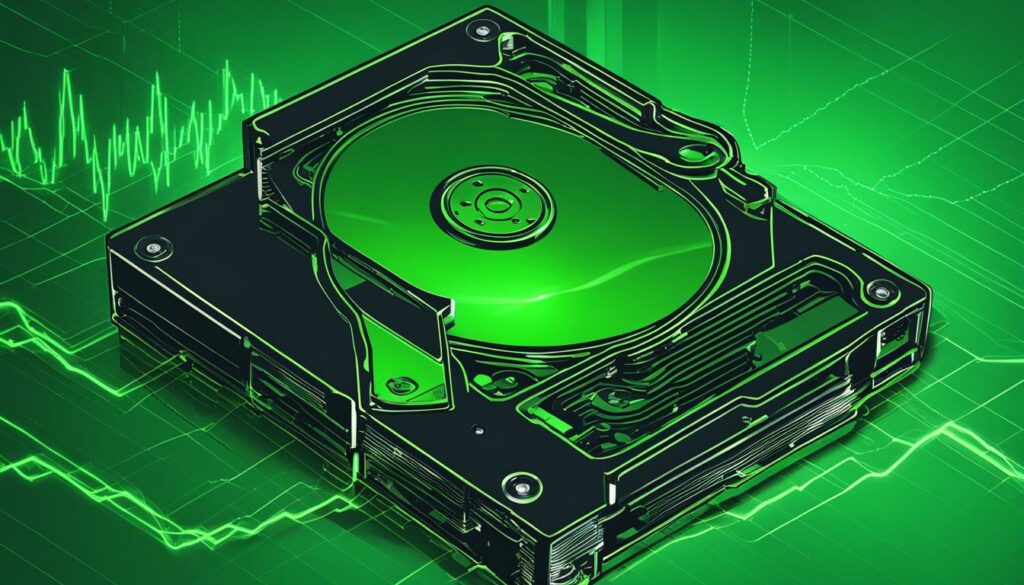When transitioning between different operating systems or using external storage devices, it is important to understand the differences between file systems such as FAT32 and APFS. FAT32 is a file system commonly used in Windows, while APFS is the default file system for Mac. However, these file systems are not always compatible, leading to issues with accessing and transferring files. This article will provide a comprehensive guide on data recovery across different file systems, including methods for recovering data from FAT32 and APFS drives.
Key Takeaways:
- Data recovery across different file systems is crucial when transitioning between operating systems or using external storage devices.
- FAT32 is a file system commonly used in Windows, while APFS is the default file system for Mac.
- Data recovery software designed for specific file systems can help retrieve lost files from FAT32 and APFS drives.
- Converting file systems may offer better compatibility and data recovery options.
- Having a backup of important files is recommended to avoid data loss.
Understanding the Differences: FAT32 vs. APFS
When it comes to file systems, there are significant differences between FAT32 and APFS. FAT32, which stands for File Allocation Table 32, is an older file system that is widely used in Windows operating systems. It offers compatibility across different platforms, making it easy to transfer files between different devices and operating systems. However, FAT32 has its limitations. It does not support file sizes larger than 4GB, which can be a problem when dealing with large media files or software installations. Additionally, FAT32 has a maximum partition size of 2TB, which can be constraining for users with larger storage needs.
On the other hand, APFS (Apple File System) is the default file system for Mac computers. It is a more modern and advanced file system that is specifically designed for Apple devices. APFS offers several benefits over FAT32, including improved performance, enhanced security features, and efficient file management. However, APFS is not compatible with Windows operating systems, which can create problems when trying to access APFS-formatted drives on a Windows PC.
Understanding these differences is crucial when it comes to selecting the right file system and ensuring compatibility between different devices. It is important to consider the specific needs and requirements of your operating system and devices, as well as the type of files you will be working with. This will help you make an informed decision and choose the file system that best suits your needs.
Table: Comparison of FAT32 and APFS
| File System | Compatibility | File Size Limit | Partition Size Limit |
|---|---|---|---|
| FAT32 | Compatible with Windows, Mac, and Linux | Maximum file size of 4GB | Maximum partition size of 2TB |
| APFS | Compatible with Mac | No file size limit | No partition size limit |
Recovering Data from FAT32 Drives
When it comes to recovering data from FAT32 drives, there are several effective methods that you can use. One option is to utilize data recovery software specifically designed for FAT32 file systems. These software tools are equipped with advanced scanning and retrieval capabilities, allowing you to recover lost files from your FAT32 drive.
Using data recovery software for FAT32 is a straightforward process. Simply install the software on your computer, connect the FAT32 drive, and run the program. The software will analyze the drive, identify the lost files, and provide you with the option to restore them to a location of your choice. Whether your files were accidentally deleted or the drive was formatted, data recovery software for FAT32 can help you retrieve your valuable data.
Another approach to recovering data from FAT32 drives is to consider file system conversion. Converting your FAT32 drive to a different file system, such as NTFS or exFAT, can potentially provide better compatibility and data recovery options. However, it’s important to note that converting the file system may involve formatting the drive, which can result in data loss. Therefore, it is essential to back up your files before attempting any file system conversions.
Example Table: Comparison of FAT32 Data Recovery Methods
| Method | Pros | Cons |
|---|---|---|
| Data Recovery Software for FAT32 | Easy to use, can recover various file types, doesn’t require drive formatting | May not be able to recover all files in certain scenarios |
| File System Conversion | Potential for better compatibility and data recovery options | Involves drive formatting, which can result in data loss |
By considering these methods and understanding the pros and cons, you can increase your chances of successfully recovering data from your FAT32 drives. Remember to always handle data recovery with caution and prioritize the backup of your important files to avoid any potential loss.

Recovering Data from APFS Drives
Recovering data from APFS drives can be a daunting task, especially with the limited support for APFS on non-Mac systems. However, there are still options available for data recovery. Using specialized data recovery software for APFS can be an effective solution. These software tools are designed to scan the APFS drive and retrieve lost files, even in cases of accidental deletion or formatting. It is important to choose a reliable and reputable data recovery software to ensure the best chances of successful recovery.
In addition to data recovery software, another option to consider is converting the APFS drive to a compatible file system. Converting the APFS drive to a file system such as exFAT or HFS+ can provide better data recovery options. However, it is crucial to note that file system conversion should be done cautiously and with the help of professional guidance, as it may result in data loss or drive corruption if not performed correctly.
When attempting data recovery from APFS drives, it is essential to handle the process with care to avoid further data loss or damage to the drive. It is advisable to seek the assistance of data recovery experts who specialize in APFS data recovery. These experts have the knowledge and tools to handle the intricacies of APFS drives and maximize the chances of successful data retrieval.
Overall, recovering data from APFS drives may pose challenges, but with the right tools, techniques, and professional guidance, it is possible to retrieve valuable files. Whether through specialized data recovery software or file system conversion, exploring different options can increase the chances of successful data recovery from APFS drives.

Table: Comparison of Data Recovery Options for APFS Drives
| Data Recovery Option | Pros | Cons |
|---|---|---|
| Specialized Data Recovery Software for APFS | – Designed specifically for APFS drives – Can scan and recover lost files – User-friendly interface |
– May not have 100% success rate – Requires technical knowledge – Quality and effectiveness vary between software |
| File System Conversion | – Provides better data recovery options – Compatibility with non-Mac systems – Can increase chances of successful recovery |
– Requires professional guidance – Potential risk of data loss or drive corruption – File system conversion may not always be possible |
| Seeking Professional Data Recovery Services | – Expert knowledge and experience in APFS data recovery – Higher chances of successful retrieval – Specialized tools and techniques |
– Costly option – Delivery times may vary – Requires trust in the service provider |
Conclusion
Navigating different file systems and recovering data can be a complex process, but with the right tools and methods, it is possible to retrieve lost files from various file systems. Whether you are dealing with a FAT32 or APFS drive, file system recovery solutions can help in recovering your valuable data.
For cross-platform data recovery, data recovery services can provide expert assistance. These services specialize in recovering data from different file systems and can ensure a smooth and successful recovery process.
It is important to note that file system independent data recovery is possible with the right techniques. By using data recovery software and file system conversion methods, you can increase your chances of recovering your data, even when faced with compatibility issues.
While it is always recommended to have a backup of your important files to avoid data loss, accidents happen. In case of accidental deletion or formatting, data recovery services and software are available to assist you in recovering your data across different file systems.
FAQ
What is the difference between FAT32 and APFS?
FAT32 is an older file system commonly used in Windows, while APFS is the default file system for Mac. FAT32 offers compatibility across different operating systems but has limitations in terms of file size and partition size. APFS is a more modern file system with advanced features and better performance, but it is not compatible with Windows.
How can I recover data from a FAT32 drive?
There are multiple methods available to recover data from a FAT32 drive. You can use data recovery software specifically designed for FAT32 drives to scan the drive and retrieve lost files, even if they have been deleted or formatted. Another option is to convert the FAT32 drive to a different file system, such as NTFS or exFAT, which may offer better compatibility and data recovery options.
Is it possible to recover data from APFS drives?
Recovering data from APFS drives can be more challenging due to limited support on non-Mac systems. However, there are still options available. You can use data recovery software specifically designed for APFS to scan the drive and recover lost files. Additionally, converting the APFS drive to a compatible file system, such as exFAT or HFS+, may provide better data recovery options.
How should I approach data recovery to avoid further data loss or damage to the drive?
Data recovery should be done carefully to avoid further data loss or damage to the drive. It is recommended to use reputable data recovery software and follow the instructions provided. If you are not confident in performing data recovery yourself, it is advisable to seek professional data recovery services for assistance.
Should I have a backup of my important files to avoid data loss?
Yes, having a backup of your important files is always recommended to avoid data loss. Regularly backing up your data to an external storage device, cloud storage, or other backup solutions can provide protection against accidental deletion, formatting, or other data loss situations.
